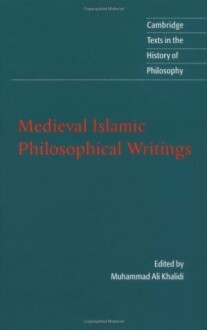Unlock the Wisdom of Medieval Islamic Philosophers: A Review
Key Takeaways
- This collection of medieval Islamic philosophical writings provides a comprehensive introduction to the key concepts and ideas of the period.
- Edited by Muhammad Ali Khalidi, this book offers a unique perspective on the intersection of philosophy and spirituality in Islamic thought.
- Exploring the works of prominent thinkers, this volume sheds light on the significant contributions of Islamic scholars to the development of Western philosophy.
In the 8th to 14th centuries, Islamic scholars and philosophers made significant contributions to the development of philosophy, science, and mathematics. This period, often referred to as the Islamic Golden Age, saw the emergence of influential thinkers such as Ibn Sina, Ibn Rushd, and Ibn Arabi, who shaped the course of Western philosophy.
About Medieval Islamic Philosophical Writings
Medieval Islamic Philosophical Writings is a comprehensive collection of philosophical texts edited by renowned scholar Muhammad Ali Khalidi. This volume provides an unparalleled introduction to the key concepts and ideas of the Islamic Golden Age, a period that saw the emergence of influential thinkers who shaped the course of Western philosophy.
The book is divided into three main sections, each focusing on a specific aspect of Islamic philosophical thought. The first section explores the works of prominent thinkers such as Ibn Sina and Ibn Rushd, while the second section delves into the philosophical debates and discussions of the period. The third section provides a comprehensive overview of the key concepts and ideas that emerged during this era.
| Features | Description |
|---|---|
| Comprehensive coverage | This volume provides a comprehensive introduction to the key concepts and ideas of the Islamic Golden Age, making it an essential read for anyone interested in the subject. |
| Edited by Muhammad Ali Khalidi | Renowned scholar Muhammad Ali Khalidi has edited this volume, ensuring that the texts are presented in a clear and concise manner. |
| Divided into three sections | The book is divided into three main sections, each focusing on a specific aspect of Islamic philosophical thought, making it easy to navigate and understand. |
This collection of medieval Islamic philosophical writings is a must-read for anyone interested in the development of Western philosophy, Islamic thought, and the intersection of philosophy and spirituality.
- Provides a comprehensive introduction to the key concepts and ideas of the Islamic Golden Age
- Edited by renowned scholar Muhammad Ali Khalidi
- Divided into three main sections, making it easy to navigate and understand
Evaluating Medieval Islamic Philosophical Writings
Pros
- A comprehensive introduction to the key concepts and ideas of the Islamic Golden Age
- Edited by renowned scholar Muhammad Ali Khalidi, ensuring a clear and concise presentation of the texts
- The book is divided into three main sections, making it easy to navigate and understand
- A valuable resource for anyone interested in the development of Western philosophy, Islamic thought, and the intersection of philosophy and spirituality
- Provides a unique perspective on the intersection of philosophy and spirituality in Islamic thought
Cons
- The book may be too dense for readers without a background in philosophy or Islamic studies
- The language and terminology used in the texts may be challenging for some readers
- The book does not provide a comprehensive overview of the historical context in which the texts were written
In conclusion, Medieval Islamic Philosophical Writings is a valuable resource for anyone interested in the development of Western philosophy, Islamic thought, and the intersection of philosophy and spirituality. While it may present some challenges for readers without a background in philosophy or Islamic studies, the comprehensive introduction and clear presentation of the texts make it an essential read for anyone looking to gain a deeper understanding of this period in history.
Unlock the Wisdom of the Medieval Islamic Golden Age
Now that you have a comprehensive understanding of Medieval Islamic Philosophical Writings, it's time to take your knowledge to the next level. Here are some tips to keep in mind when buying similar products:
Becoming a Discerning Reader
- Look for collections of philosophical texts that provide a comprehensive introduction to the subject matter.
- Choose editors who are renowned scholars in the field to ensure a clear and concise presentation of the texts.
- Consider books that are divided into easily digestible sections to help you navigate the material.
When evaluating Medieval Islamic Philosophical Writings, you may have noticed some drawbacks, such as the dense language and terminology used in the texts. However, with the right mindset and a willingness to learn, this book can be a valuable resource for anyone interested in the subject.
Overall, Medieval Islamic Philosophical Writings is a must-read for anyone looking to gain a deeper understanding of the intersection of philosophy and spirituality in Islamic thought. With its comprehensive introduction, clear presentation, and unique perspective, this book is an essential addition to any philosophy or Islamic studies library.
So, what are you waiting for? Unlock the wisdom of the medieval Islamic Golden Age and discover the significance of Islamic philosophical thought for yourself.
Check Current PriceUnpacking the Wisdom: Frequently Asked Questions about Medieval Islamic Philosophical Writings
-
Q: What is the significance of the Islamic Golden Age in the development of Western philosophy?
A: The Islamic Golden Age played a crucial role in the development of Western philosophy, as it was during this period that Islamic scholars and philosophers made significant contributions to the fields of philosophy, science, and mathematics. This period saw the emergence of influential thinkers such as Ibn Sina, Ibn Rushd, and Ibn Arabi, who shaped the course of Western philosophy.
-
Q: How does the book cover the intersection of philosophy and spirituality in Islamic thought?
A: The book provides a comprehensive overview of the intersection of philosophy and spirituality in Islamic thought, exploring the works of prominent thinkers such as Ibn Sina and Ibn Rushd, and shedding light on the significant contributions of Islamic scholars to the development of Western philosophy.
-
Q: What is the format of the book, and how does it make it easy to navigate and understand?
A: The book is divided into three main sections, each focusing on a specific aspect of Islamic philosophical thought. This format makes it easy to navigate and understand the complex ideas and concepts presented in the book.
-
Q: Are the texts in the book written in an accessible language, or are they dense and challenging to read?
A: The texts in the book are written in a clear and concise manner, making them accessible to readers with a background in philosophy or Islamic studies. However, readers without a background in these fields may find the language and terminology used in the texts challenging to understand.
-
Q: What is the value of this book for readers interested in the development of Western philosophy, Islamic thought, and the intersection of philosophy and spirituality?
A: This book is a valuable resource for anyone interested in the development of Western philosophy, Islamic thought, and the intersection of philosophy and spirituality. It provides a comprehensive introduction to the key concepts and ideas of the Islamic Golden Age, shedding light on the significant contributions of Islamic scholars to the development of Western philosophy.













